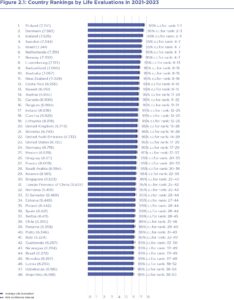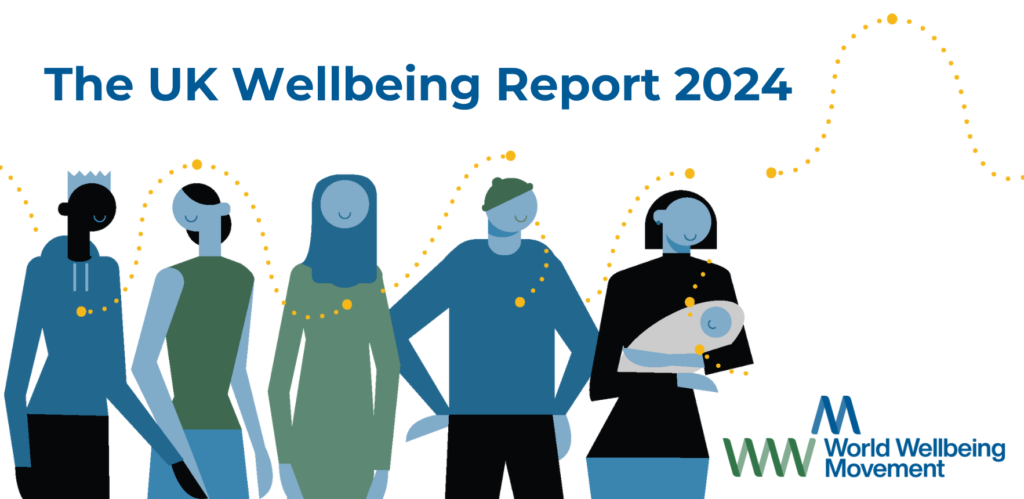20.03.2024 | 8 min read
1 in 8 people in the UK are living below the ‘Happiness Poverty Line’
The World Wellbeing Movement's inaugural UK Wellbeing Report, published today, finds 1 in 8 people in the UK are living below the ‘Happiness Poverty Line’.Data released today, on International Day of Happiness (March 20th), shows that 1 in 8 (12%) people in the UK are living below the Happiness Poverty Line, a term coined by the World Wellbeing Movement in their inaugural UK Wellbeing Report.
The report reveals:
- 1 in 8 people in the UK are living below the Happiness Poverty Line
- Wales has the highest number of residents living below the Happiness Poverty Line (14%) and Northern Ireland has the least (11%)
- Steep wellbeing inequalities across the UK, with as little as 1 in 20 people living below the Happiness Poverty Line in Watford, Woking, and High Wycombe, and as high as 1 in 4 in Birkenhead and Redditch
- The UK has not recovered to pre-pandemic wellbeing levels, with the number of people living below the Happiness Poverty Line at risk of stabilising at a higher rate than in 2019
The report looks at the life satisfaction of people living in the UK, classifying those scoring five and under on a scale of 0-10 as living below the Happiness Poverty Line. It reveals Wales as the worst performing nation – with roughly 14% of residents living below the happiness poverty line, followed by Scotland (13%), England (11.5%) and Northern Ireland as performing best, with only 11% of its population living below the line.
The World Wellbeing Movement argues that data on population wellbeing provides a more accurate measure of societal success than GDP. It claims the reliance on GDP alone as a measure of progress and development is flawed: GDP, the monetary value of goods and services bought during a given time, focuses solely on the economic health of the country, as opposed to the broader health and wellbeing of its people.
Prior to the Covid-19 pandemic, wellbeing trends in the UK were broadly positive and the percentage of people living below the Happiness Poverty Line was steadily decreasing.
Unsurprisingly this trend reversed during the pandemic, but despite some improvements, wellbeing rates have not recovered to pre-pandemic levels, levelling off at a lower level than in 2019. Likewise, the number of people living below the happiness poverty line is at risk of levelling off at a higher rate than before the pandemic: we’ve witnessed increased shares of people living below the happiness poverty line in 60% (210) of local authorities and 63% (70) of all major cities in the UK.
The World Wellbeing Movement warns that without urgent government action to improve UK residents’ wellbeing, this trend is set to continue.
The report also reveals steep wellbeing inequalities across the UK. Birkenhead and Redditch have the highest share of people living below the happiness poverty line in the UK, with 1 in 4 (25-26%) people there living below the line – nearly 5% more than the next worst-performing city, Carlisle.
This is in stark contrast to the top three performing cities: Watford, Woking, and High Wycombe, who each have only around 1 in 20 (or 5-6%) of their residents living below the Happiness Poverty Line.
The UK Wellbeing report coincides with the launch of the World Happiness Report, which reviews the state of happiness in the world annually. The latest report, launched today (March 20th), shows the UK’s happiness ranking has steadily decreased since 2019 – dropping from 13th place to 20th place and falling behind Iceland, Finland and Canada.
The organisation is urging government to end wellbeing inequalities across the UK by making wellbeing the priority aim of all policy decisions. It warns that if wellbeing is not prioritised, the UK risks losing its place in the top 20 countries’ global ranking for happiness – which it has held since 2017.

Global Rankings from the World Happiness Report 2024.
The organisation believes that transitioning to a Wellbeing Economy would not only have positive impacts on people’s wellbeing, but also improve multiple sectors currently in crisis – such as housing, health, social care and education.
A Wellbeing Economy is designed to serve people and the planet, placing their needs at the core of all economic activity. Instead of viewing economic growth as the ultimate goal, it strives to ensure that these needs are equally addressed and met. Countries with active wellbeing policy frameworks – such as Iceland, Finland, Canada and Australia – tend to rank higher in the World Happiness Rankings
Professor Lord Richard Layard, co-founder of the World Wellbeing Movement and Director, at the Centre for Economic Performance at the London School of Economics has said:
“The evidence is damning: people aren’t as happy as they were before the pandemic, and more of us are living below the Happiness Poverty Line, The succeeding government needs to prioritise wellbeing outcomes for the UK public, otherwise it’s failing its people.
“With GDP also slipping, we’re asking the incumbent and succeeding government to reflect on why GDP is the primary goal of all policy. Surely, the main priority of government should be the wellbeing of its people. Why prioritise GDP over individual wellbeing?
Wellbeing is a cross-departmental issue and improving it would be good for growth
“If government reviewed all policies through a wellbeing lens, issues impacting people’s wellbeing such as mental health would receive much more attention. Wellbeing is a cross-departmental issue and improving it would be good for growth.”
Sarah Cunningham, Managing Director of the World Wellbeing Movement has said:
“The data from our report is alarming. The number of people living below the happiness poverty line has increased tremendously since the pandemic, and although these figures look to level-off soon, it’s doing so at a much higher level than before the pandemic.
“Life satisfaction scores, that is to say people’s self-reported wellbeing, have proved to be strong predictors of people’s physical and mental health, as well as longevity. The UK government needs to take this data seriously, otherwise, it’s letting residents down.
We can build a society where the wealth of a country is measured not just in economic terms, but in the health, happiness and fulfilment of every citizen
“The current system for measuring progress and development is outdated and doesn’t reflect modern society. Systemic change is complex, but possible. There’s strong evidence to support a transition to a wellbeing economy which will benefit all individuals – both currently and in the future.”
“By refocusing our metrics of success, we can build a society where the wealth of a country is measured not just in economic terms, but in the health, happiness, and fulfilment of every citizen.”
Professor Jan-Emmanuel De Neve, co-founder of the World Wellbeing Movement and Director of the Wellbeing Research Centre at the University of Oxford, said:
“The global happiness rankings released today paint a very clear picture: the UK is unfortunately on a downward trend, underperforming when it comes to wellbeing.
The time to act is now, for the sake of our collective future
“The obsession with growth for its own sake and de-prioritisation of our collective wellbeing has led us to this point: stunting the country’s overall development in terms of improving lives. A true measure of a country’s success is not our economic progress, but the wellbeing of all.
“When people aren’t happy, it points to underlying societal issues, ranging from an increase in mental health crises to heightened social tensions. We cannot ignore the warning signs.
“We’re asking the UK government to step up and take proactive measures to address these issues – before it’s too late. The time to act is now, for the sake of our collective future.”
The UK Wellbeing Report was written by Maria Cotofan, with contributions from Prof Lord Richard Layard, Prof Jan-Emmanuel De Neve and Sarah Cunningham. Commissioned by the World Wellbeing Movement in March 2024.
